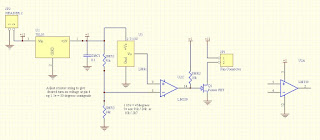As I was pondering the next step with my bag of 2SC5707 transistors the problem of heat-sinking occurred to me. An elegant solution would be to mount the transistors to the PCB but the cooling is awkward. Then I remembered how effective forced air cooling is and remembered I hadn't shared this with readers before.
I put most commercial class VHF FM transceivers way ahead of ham gear when it comes to selectivity and immunity from pagers. The only drawback I have ever noticed was with regard to transmitting duty cycle. Generally, the commercial transceiver was never intended for long overs and the heat-sinking reflects this. Fine for repeater use but if you have a long over on simplex things get hot. Sometimes very hot!
Here is a simple project that really protects that radio. First, the results of before and after measurement of heat-sink temperatures are shown below on a Philips PRM80 transmitting 25 watts into a dummy load:
It is true that many transmissions do not last 3 minutes or longer. However, a high SWR at the radio will increase the heat dissipated by the final transistor. I generally only check my antenna when I suspect it needs to be checked. So I could be transmitting for some time before any problem is detected. And while I have never sat on the microphone I am sure we have all heard someone driving around with the transmitter keyed up for extended periods.
I consider this a worthwhile addition to any PMR type radio. From the circuit below you will see that when the output of the temperature sensor reaches a set point the fan is turned on. Once the temperature falls the fan turns off.
I made mine on a small 0.8mm thick piece of PCB so that the surface mount LM61 could be mounted in a slot in the board to make contact with the heat-sink when the pcb was bolted to the heat-sink.
I'm going to use the same circuit on a forthcoming experimental HF amplifier using all of my remaining 2SC5707's. One last hurrah for them or a successful 15 watt linear amplifier for the lower HF bands.
Regards
Richard VK6TT


No comments:
Post a Comment